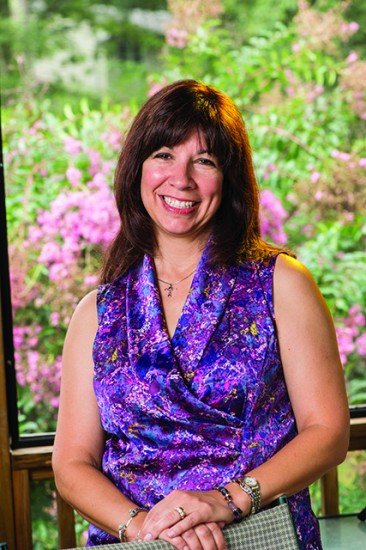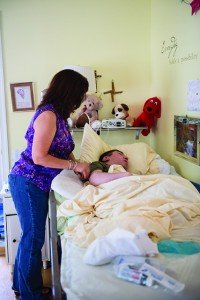Spearheading the adoption of newborn childhood screenings, Jana Monaco has given parents and their children the information necessary to cope with childhood disease.

If you became a parent or grandparent in the last decade, have a young niece or nephew or love anybody under the age of 7, you owe Jana Monaco a huge thank you. After one of her children was diagnosed with a rare genetic condition, Monaco fought for and got passed the Newborn Screening Saves Lives Act in 2008 and its reauthorization this past summer. She also helped head up the campaign to designate September as National Newborn Screening Awareness month.
Monaco is the foremost advocate for newborn rare disease screenings the country has ever seen, and she’s a supermom. She is warm and friendly, not worn out by her years of caring for a severely disabled child and hours of advocacy work, and it’s a wonder—who really is this woman?
“I’m very transparent, and I want things to be transparent. Part of that is because I grew up with a lot of secrets,” Monaco says.
Born in Mobile, Alabama, in 1965, Monaco moved to Philadelphia at the age of 5 with her mother, June, and her father, a Greek-born Merchant Marine who spent most months of the year at sea and whom Monaco did not wish to be named.
June had been married before, but Monaco didn’t remember ever meeting her mother’s previous husband.
“My first husband was your real father,” June revealed during a phone call that started with June letting Monaco know she was getting a divorce.
“I kind of knew [about my father] but never wanted to bring it up. I would snoop around, and one time I found adoption papers, but the dynamics were such [that] you just didn’t bring it up—classic with that era,” Monaco says. “But I couldn’t call him daddy. I never did.”
Monaco’s real father, James Waite, was a Korean War veteran and an alcoholic who, when Monaco was 2, fell asleep at the wheel after one too many drinks. Waite hit a car head-on that night, killing two people in the car he hit as well as his own brother, who was a passenger in the car Waite was driving, Monaco says.
That’s when Monaco says her mother, also a U.S. Army veteran, decided to leave Waite. He was sentenced to 10 years for vehicular manslaughter, and the two got divorced. June worked two jobs to keep the family afloat. After June dated her new beau for a couple of years, the family decided to leave Alabama for a better life in Philadelphia.
On the day in 2000 when Monaco found out about her father, her mother revealed another major secret: Monaco had an older brother, Jerry, and older sister, Janice, both of whom were left behind in Mobile when the family moved.
According to June, Jerry, who was 12 at the time, was too much for her to handle and had already been living with his paternal grandparents. Janice, 11 at the time, had never gotten along very well with her stepfather and had moved into her grandparents’ home as well shortly before the family decided to leave for Philadelphia. June’s intent was to send for Janice once they got settled.
“Given my sister’s age, she was fully aware of who my stepfather was at the time, as [was] my brother,” Monaco says. “Once we were in Philadelphia, my stepfather convinced my mother to leave my siblings in Mobile with family and have no further contact. This allowed them to raise me as his daughter since I was so young, and we would go on to live this perfect life as a little family, which included packing us and moving to Greece with his own family eventually.”
From then on, June never spoke of her other children to Monaco. They never visited and never called Jerry or Janice—they also never moved to Greece. The photos were hidden, and June never talked about them to anyone but her closest friends, Monaco says.
“I don’t know how they got me to not think about them,” she adds. “I always looked at pictures and knew they existed … but somehow they got me to forget.”
June died in 2003 without ever seeing her other two children again. She was very adamant about the fact that she never abandoned them, Monaco says. June knew family was taking care of her children, and that was how she was able to reconcile the notion of having left them behind, according to Monaco.
Monaco, a married woman with three of her own children when she found out, set out on a quest to find her long lost siblings until a crisis struck her own family so hard it would change her forever.
After moving around the country for a decade as a military wife, Monaco, her husband, Tom, who is a Gulf War veteran, and their three boys finally settled down in Woodbridge. After making the rank of captain in the Army, Tom left the service to become a government contractor. Monaco was happy at home with her children but still looked for a way to use her bachelor’s degree in recreational therapy.
She remembers thinking, “My little baby is all grown up” one spring day in 2001 as she watched her then-3-year-old boy go down a slide by himself. A few days later, that little boy, Stephen, was struck with what she thought was a strong stomach virus, and she was feeding him electrolyte pops in the hopes of staving off dehydration.
She put him to bed with a kiss, and they exchanged I love you’s—the last one she would ever hear him say. The next morning, Monaco says she walked in to check on her little boy and found him in a state in which no mother should ever see their child.

Eyes half-open, jaw clenched, Stephen lay lethargic in his crib, breathing rapidly as his mother tried frantically to wake him. The smell of sweaty socks permeated the room. She called 911 and rode with him to the nearest hospital, beside herself with worry. But after a barrage of tests at what was Potomac Hospital (now called Sentara), no one could figure out what was wrong with Stephen. The hospital took him and Monaco by ambulance to Inova Fairfax Hospital, which had a pediatric intensive care unit, for further evaluation. The next day, the family finally got an answer: isovaleric acidemia.
Isovaleric acidemia is a very rare genetic condition that prohibits the body from breaking down the amino acid leucine, a byproduct of protein. The leucine levels had risen so high in Stephen’s body that they were toxic, damaging and swelling his brain.
“Could something more have been done? No one would ever tell you; no one wants to incriminate themselves,” Monaco says. “But if they had taken him to Children’s [National Medical Center], they would have smelled him—each of these diseases has a unique odor. This one is a sweaty sock, almost fermented cheese, smell. They would have picked up on that right away, and they could have done the same lab work right there and expedited the results. [The doctors at] Fairfax did a wonderful job with what resources they had, but they had to carrier the labs out. It took 24 hours. Had it been in-house, the insult wouldn’t have been as bad. It wouldn’t have been perfect, but I don’t think it would have been as bad.”
An MRI further revealed Stephen’s brain damage was so extensive that it was clear the energetic and independent toddler who was running on the playground just days prior would never be seen again. Tubes ran in and out of his limp body as he was placed into Monaco’s arms. She rocked him and cried, devastated.
He had seizure after seizure and slipped into a coma. The family was told he might never recover. After days by his bedside, the family began preparing themselves to discontinue life support.
“I remember the trauma we as a family felt like it was yesterday,” says Alex Monaco, Jana and Tom’s second-oldest son. “My parents called me into the room where all the doctors were standing, and my dad says to me, ‘Stephen is probably not going to make it, and this is probably goodbye.’ I broke down and cried my eyes out. It was by far the saddest and hardest idea I have ever had to deal with. My heart sank and never came back up that day.”
But Stephen did survive, due in part to his mother’s tenacity. She got a second opinion, and the doctor told her there was a good chance Stephen could live and function on some level. The next day, he awoke from his coma.
While Stephen has extensive brain damage from which he’ll never recover, he can still smile, express joy and laugh. He is still an integral part of the Monaco family and is so well-loved that Alex and Nicholas, their oldest son, decided to become his part-time caretakers without any prompting from Monaco.
“Jana, as most mothers would, as did I, felt a sense of failure that somehow we could have/should have prevented what happened to Stephen,” Tom Monaco said in an email. “In reality, the medical community failed us.”
Had Stephen been born just south in North Carolina, he would have been tested for his genetic condition at birth, and all of this trauma would have been avoided.
The couple spent hours researching all they could about rare genetic diseases. What they found was disturbing: There was no national guideline for the number of diseases states should screen for; some genetic screening costs as little as $25, but the states still found them not cost-effective enough to do them; and Stephen’s crisis could have all been prevented if he had just been eating the right formula from birth.
“If we could rewrite this story, it would be very different,” Monaco says.
The unwitting poster family for the disease, the Monacos welcomed a daughter, Caroline, in 2002. She tested positive for isovaleric acidemia soon after her birth. But her story would prove to be very different. Doing a newborn screening changed everything.
“I remember Jana told me that she stood bedside one day during his initial crisis and promised Stephen that his plight would not go in vain,” Tom recalls.
Caroline was instantly put on a special formula low in protein. Today, while a petite 12-year-old, the youngest Monaco still plays soccer, goes to public school and does all the things a normal preteen would do.
However, Stephen can no longer walk, talk or eat on his own. Caroline became a living testimony for how screenings can save lives. Monaco worked tirelessly to never let what happened to Stephen happen to another family again. In 2002, Tom and Jana began speaking out to advocate for newborn screenings.
“She became even more focused and determined after Stephen’s crisis,” says longtime friend and retired Army Col. Ellen Fostr.
In 2002, the Monacos met with the House of Representatives subcommittee on health about newborn screenings. Jana Monaco spoke repeatedly at meetings for organizations such as Virginia Genetics Advisory Committee, the Advisory Committee on Heritable Disorders and Genetic Diseases in Newborns and Children, Children Committee of the Health Resources and Services Administration and Northern Virginia Pediatric Society.
She became the chair of the Patient and Family Advisory Council at Children’s National Hospital Center and was selected to be on the New York-Mid-Atlantic Regional Collaborative Advisory Committee. She received the Maternal and Child Health Bureau Director’s Award, became a National Genetic Policy Summit panel member and served on the Health Resources and Services Administration Advisory Committee for Heritable Disorders and Genetic Diseases in newborns and children. Through all these positions and speaking arrangements, she helped form the Newborn Screening Saves Lives Act that passed in 2008 with a reauthorization bill passing just last summer.
Before the NSSL Act, there were only 15 states that screened for 29 core conditions defined and recommended by the Health Resources and Services Administration and the American College of Medical Genetics’ 2004 report. In 1997, when Stephen was born, there were only nine genetic disorders being screened for in Virginia.
Today, all 50 states have at least the core 29 screenings, and some, like Colorado, have as many as 35. Monaco is working to help add two more to the core—severe combined immunodeficiency, otherwise known as “bubble boy” syndrome, and critical congenital heart disease. She is also working hard to have special medical formulas, like the one Stephen is on, covered under the Affordable Care Act. It is no exaggeration to say that her work has saved—and continues to save—thousands of babies’ lives.
“She’s just always been such a force,” says Dr. Michele Lloyd-Puryear, special advisor to the director of the office of dietary supplements at the National Institutes of Health. “She hasn’t slowed down at all.”
Monaco still serves as the chair of the Patient and Family Advisory Council at Children’s National and helps plan the Rare Disease Day event every year. She travels the country to speak about Stephen, and she never leaves him behind. She speaks on the importance of newborn screenings and advocates for advancements in medicine like electronic health record sharing and collecting anonymous blood samples from newborns to further medical research.
She is Stephen’s predominant caretaker, but she also has her two other sons, Nicholas and Alex, Caroline, Tom and two dogs, Cleo and Bella, that she tends to as well.
“She does an amazing job juggling everything around the house. I don’t think anyone could do a better job than her with what she has to do around here,” Alex says.
Through the numerous hospital visits and therapy sessions, Monaco still finds time to stay up late helping her other children with their homework assignments and taking them on outings around D.C. and Baltimore. Her family remains her prime focus.
And she never forgot about Jerry, her big brother, and Janice, her sister. She did some research of her own online but got nowhere. When her mother died, she made a quilt in her memory, and a tribute ran in a local paper. Someone called her soon after asking a lot of questions, and Monaco knew something was happening.
“‘I liked the tribute to your mom’ this woman says,” she recalls. “Well, it turned out to be a cousin-in-law doing a genealogy project.”
Through her cousin-in-law, Sheila, Monaco was eventually reunited with her long-lost sister in a Hallmark moment, she says, at Reagan National Airport with lots of flowers, tears and cries of joy that Tom caught on video. She would later meet Jerry in Alabama, surrounded by his multitude of children and grandchildren with similar tears of happiness.
Now Monaco had the family she had been searching for all these years. Sadly, her father had already passed away the year before she reunited with her sister.
“I was told he always loved me,” she says. “[He] had hoped that my siblings would find me some day. I will always have a sad place in my heart that he died and we never got to see each other again.”
But Monaco doesn’t blame her mother. She is not the type to pass judgment on anyone.
“One thing I don’t want to do is make my mother and father sound like horrible people. They were far from it. They just lived some difficult times and made some choices that weren’t the best,” she says. “One thing that did exist was love.”
Today, the walls within Monaco’s spacious Woodbridge home are covered with family photos and crosses. Her love for family and her Catholic faith gives her strength and courage to continue her selfless quest to save more babies’ lives. Still, she finds time to dream about the beach, occasionally have a cup of tea at the Rosemont in Berryville or hit up a good estate sale every now and then.
“They really are my secret pleasure,” she says with a twinkle in her eye as if she just spilled her dirtiest secret.
And through all the struggles with her family’s past and present, through all the sleepless nights she spends at hospitals for Stephen’s continuing issues, past all the obstacles she has had to overcome and continues to overcome to get legislation passed, you will never hear her complain. Her smile doesn’t fade, her enthusiasm doesn’t dwindle, and she is devoted to helping others.
Perhaps the one closest to her says it best: “I’m truly in awe of what she does,” her husband of 28 years said in an email. “When many would want to fold up their tent and go home, she erected a village of tents for others to come and share their stories and get some sense of peace that they too could handle what was ahead.”
(September 2015)





